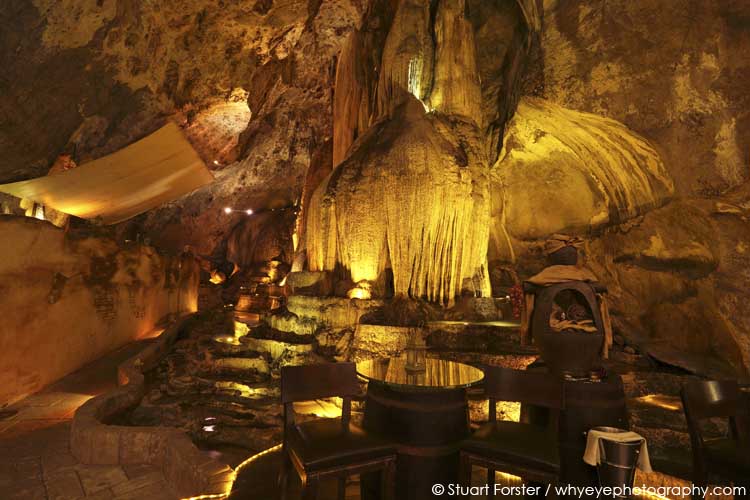Stuart Forster reports from the Banjaran Hotsprings Retreat in Malaysia.
“We discovered this place as guests. We were spending a long weekend here and blown away because we both love nature and jungle,” says Lucia Eppisser, who along with her husband and business partner, Felix, took over the management of the Banjaran Hotsprings Retreat in August 2014.
We’re chatting on wooden decking by the geothermally heated pool at the heart of the 16-acre luxury resort and I’m sipping freshly pressed juice. Just minutes ago I was relaxing in one of the warm dipping tubs on the far side of the pool and dreamily observing dusk settling over the steep, densely forested limestone hills surrounding the Banjaran.
Caves with Japanese graffiti
Wisps of water vapour are swirling over the surface of the pool, which the Japanese Army used as a base for rest and recuperation during World War Two. Graffiti etched into the walls of caves formed during the Paleozoic Era – around 260 million years ago – provides evidence of their occupation. The naturally heated pool and steam caves have something distinctly reminiscent of the onsen baths I’ve visited in Japan.
Nearby Ipoh is renowned for its many Buddhist cave temples. The Banjaran’s caves, meanwhile, are used mainly for wellness activities. I pop into the crystal cave then spend time in the multi-level meditation cave, which provides a place of quietude suited to contemplation. Candle-lit yoga sessions are held here too.
A subterranean wine cellar
Another cave has been converted into an impressive subterranean bar and wine cellar. Jeff’s Cellar is named after the Banjaran’s owner, Jeffrey Cheah, the chairman of the Sunway Group, who stores a collection of his vintage bottles in the subtly lit cave. Stalactites and rock pools mean there’s no need for interior décor beyond wood decking plus, of course, tables and chairs.
Within Jeff’s Cellar, I dine on an exquisitely presented tasting menu overseen by Felix Eppisser, who was awarded a Michelin star for his restaurant Spice at the Aparthotel Rigiblick in Zurich, Switzerland. He’s now the culinary director at the Banjaran.
Modern and healthy cuisine
“We do Malaysian dishes in a modern, healthy way with organic vegetables and microgreens and salads on the side,” says Felix. Normally meals are served in Pomerol, the open-fronted, thatch-roofed restaurant near the entrance to the resort. “A lot of the ideas come from Malaysia and South-East Asia but with cooking techniques from Europe,” he adds.
His wife deals primarily with the HR side of the business. Felix is also involved in maintenance. The couple moved to the Banjaran from Le Planteur Restaurant and Lounge in Yangon, Myanmar, and are aiming to make this place known as one of the best spa destinations in Asia.
The Banjaran has 25 villas, around half of which have terraces with private pools and enclosed terraces. Those that don’t have pools have waterfront balconies.
Holistic wellness programmes
The resort is suited to breaks of a couple of days or longer stays, involving wellness programmes lasting from between two days to three weeks.
Dr Rejith Daniel, an Ayurvedic doctor from Kerala, in India, is the Banjaran’s spa director. Guests receive a one-to-one consultation ahead of treatments, even if that’s just a massage.
“We try to advise a healthy routine, combining our treatments, that will be long term,” says Dr Daniel. He gets guests to think about their diet and lifestyle and aims to have people adopt new, improved and ultimately sustainable routines. He’s very keen to get people away from blaming the pressures of work for eating badly and maintaining what he terms “an upside down routine.”
I experience the Banjaran Signature Massage, 90 minutes of blissful pummelling by a diminutive masseuse whose hands go work on my head before soothing away knots between my shoulder blades and then easing tension in the soles of my feet.
Prior to departing, I join one of the guided walks held each morning on paths leading through the jungle around the resort, which seems well-positioned for achieving the goal of becoming recognised as one of the best on the Asian continent.
Getting there
Malaysia Airlines flies twice daily, in each direction, between London Heathrow and Kuala Lumpur International Airport.
The Banjaran is located on the outskirts of Ipoh, a two-hour drive from Kuala Lumpur. The Cameron Highlands and Penang are both around 1.5 hours by road from the resort.
Further information
The Banjaran Hotsprings Retreat (No. 1, Persiaran Langun Sunway 3, 31150 Ipoh, tel. + 605 210 7777) website has more information about the resort, its facilities and on-site wellness programmes. Guests must be aged 12 and above.
In addition to a naturally heated pool, the Banjaran has a freeform swimming pool, a reflexology pool plus a pool holding a shoal of garra rufa fish. Try dipping your feet for a course of treatment by ‘Dr Fish’. If you can stand the tickling of their nibbling they’ll clear away dead skin from your soles.
For more on the surrounding region and country as a whole, visit the Tourism Malaysia website.
Photos illustrating this post are by Why Eye Photography.
If you enjoyed this post why not sign up for the free Go Eat Do newsletter? It’s a hassle-free way of getting links to posts on a monthly basis.
‘Like’ the Go Eat Do Facebook page to see more photos and content.



